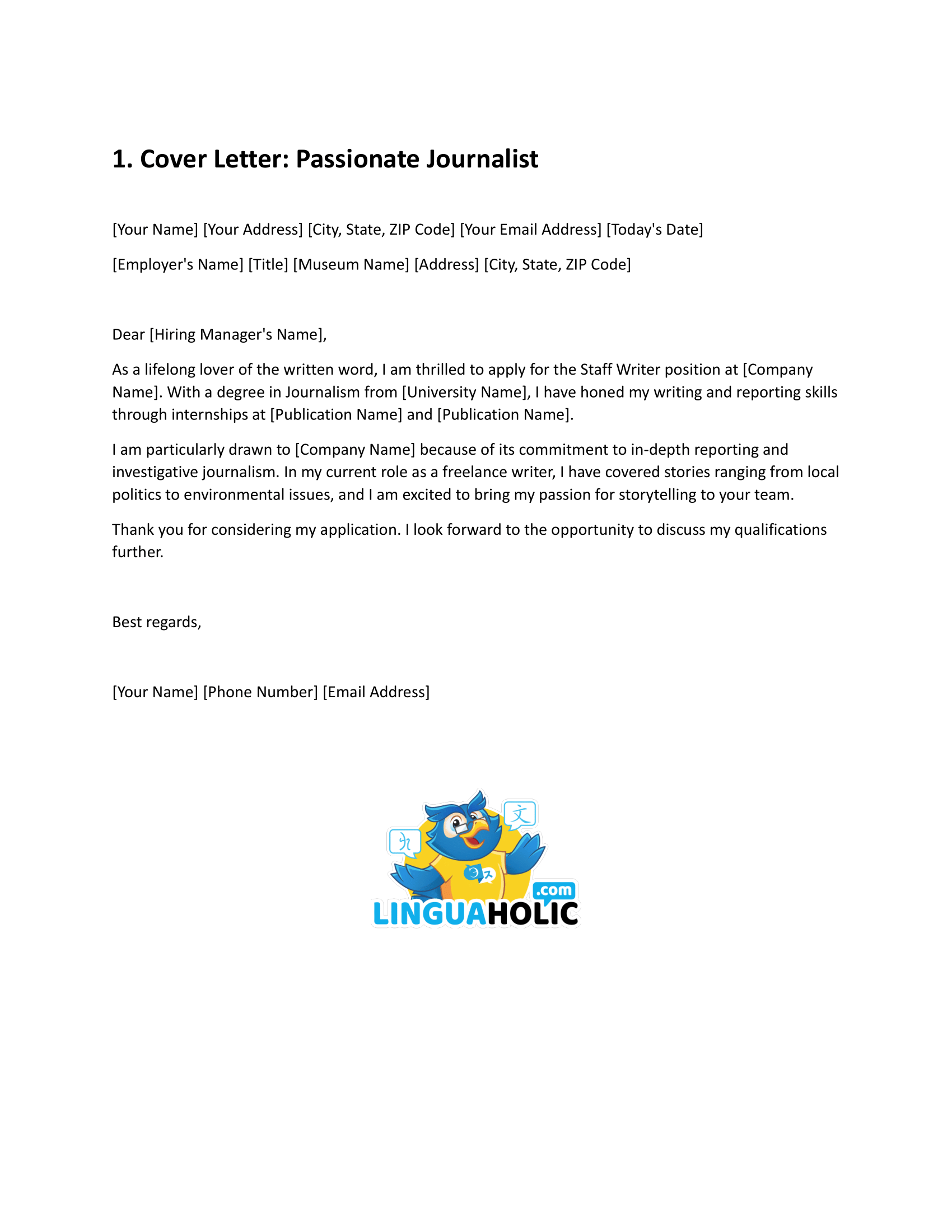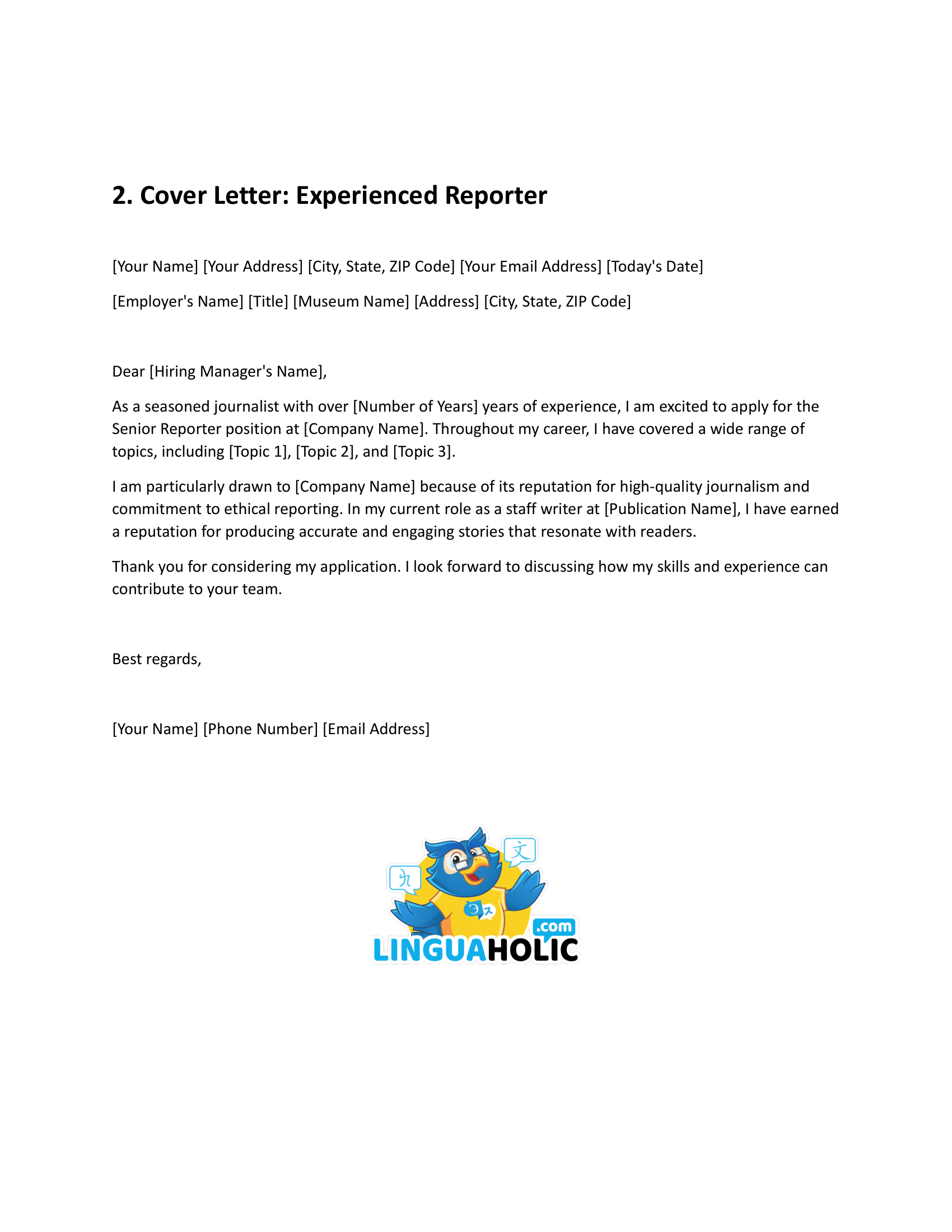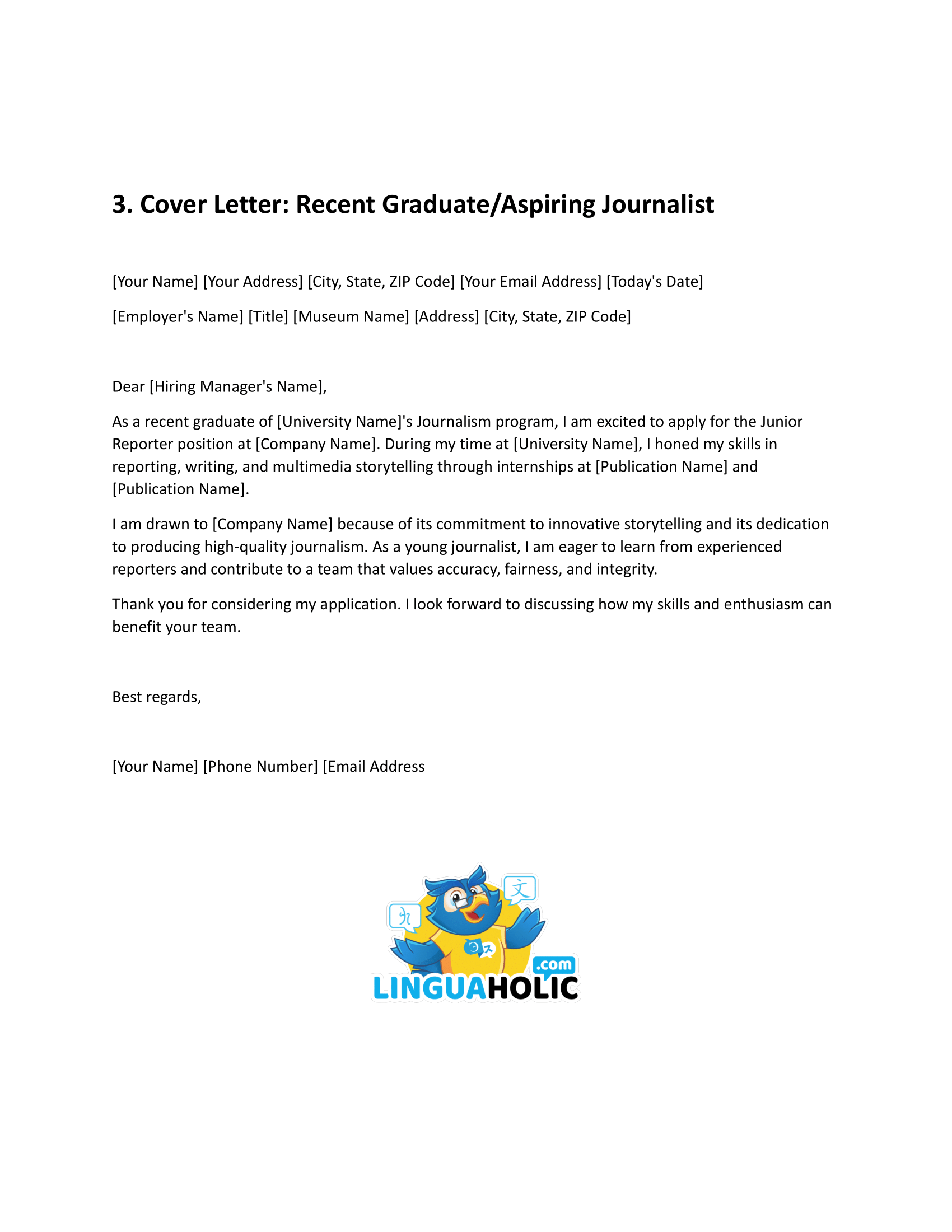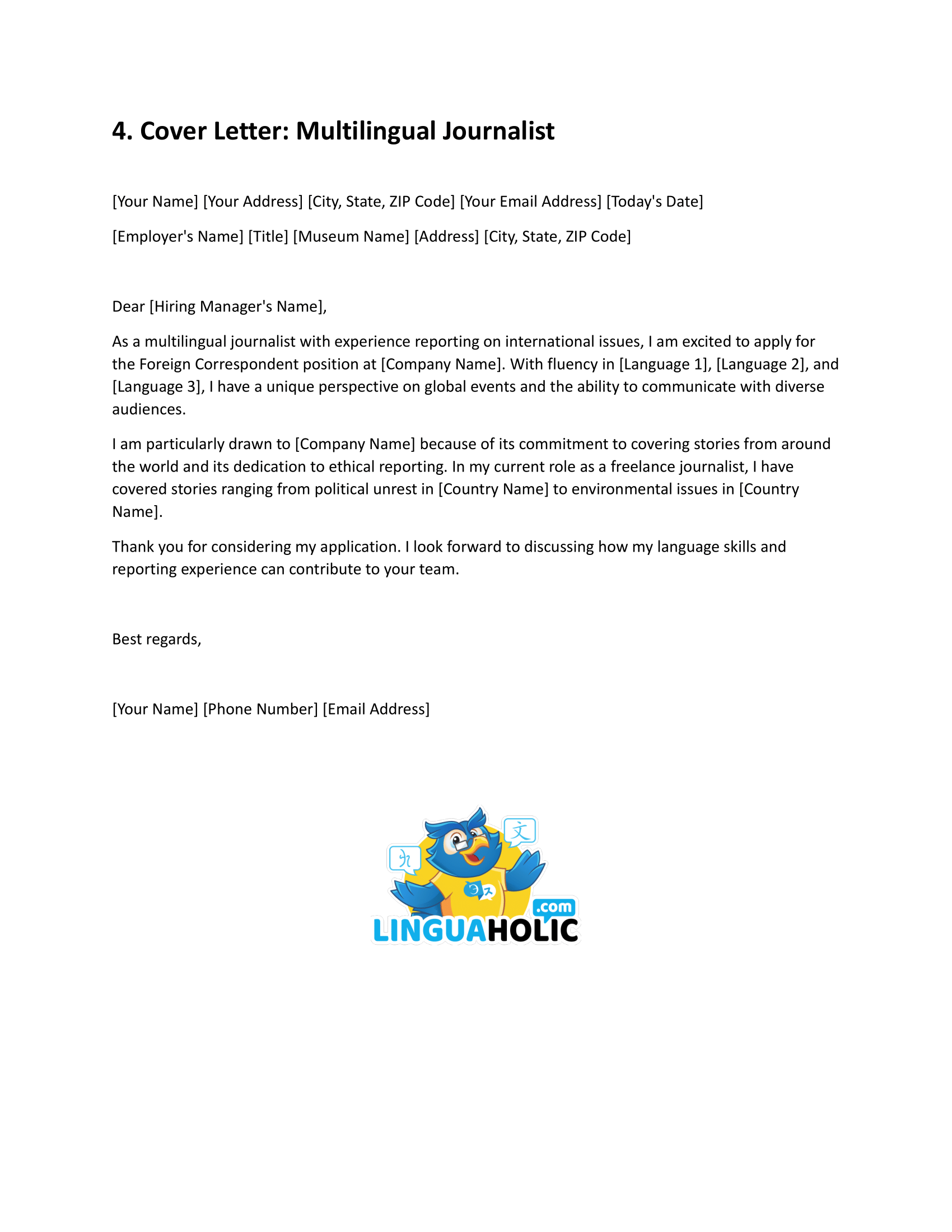Key Takeaways
- Research the company and the job description before writing your cover letter
- Highlight your skills and achievements, including your experience in journalism and your passion for the industry
- Conclude your cover letter with a strong call to action, inviting the employer to contact you for an interview.
If you’re a journalist looking for a job, you know how important it is to have a great cover letter.
Your cover letter is your chance to showcase your skills, experience, and passion for the field.
A well-written cover letter can set you apart from other candidates and help you land the job you want.
Writing Your and the Journalism’s Job Contact Information
When writing a cover letter for a journalism job, it is important to include both your contact information and the contact information of the job you are applying for.
Your contact information should include your full name, email address, and phone number. This should be written at the very top of the cover letter, and should also include today’s date.
For example:
It is important to ensure that this information is up-to-date and accurate, as this will be the primary means of communication between you and the hiring manager.
The contact information of the journalism company should be written below your own. This should include the name of the hiring manager if it is known. If unknown, you may write “Hiring Manager”.
You’ll also want to include the name of the publication or company, their address, and the email address or phone number. This information can typically be found in the job listing or on the company’s website.
Specify the journalism job you are applying for
You should start the journalism cover letter by addressing the hiring manager by name, if you have it.
If you don’t have the name of the hiring manager, you can address the letter to the position itself, such as “Dear Hiring Manager” or “Dear Editor-in-Chief.”
In the first paragraph of your journalism cover letter, you should state the position you are applying for and where you found the job opportunity.
This could be through a job posting, a referral, or research you have done on the museum or company’s website.
For example:
“I am writing to apply for the position of Staff Writer, which I found on The Washington Times’ website.”
State why you are a good fit for the journalism job
In the next part of the same paragraph, it’s important to convey why you are a good fit for the position.
These 1-2 sentences typically reflect the number of years you’ve been in the journalism field, or your most impressive experience as a journalist.
For example:
This part is just a brief overview of your experience, so you want it to stand out to an employer immediately.
An impressive number of years is usually best here, but you may also include an impressive job or skill the employer may be interested in.
Include the reason you want to be part of the journalism team
When writing a cover letter for a journalism job, it is important to tell the company why you are applying to this specific position.
First and foremost, your interest in journalism should be evident. You should explain why you are passionate about journalism and what motivates you to pursue a career in this field.
This will show the employer that you have a genuine interest in the job and are not just applying for the sake of it.
Typically, you should highlight your passion for current events and storytelling. You may also include reasons specific to this particular publication, such as their coverage of certain types of events.
For example:
Do not include reasons such as “this company is a close commute from my house” or “the pay rate is high”, as these are valid, yet superficial reasons.
The hiring manager wants someone on the team who is excited to work there because they are passionate about the work, so show them that you are!
Include your relevant journalism work experience
When writing a cover letter for a journalism job, it is important to include your relevant journalism work experience. This section should highlight your experience in the field and showcase your skills and abilities.
This section should be 1-2 paragraphs highlighting your most important jobs, skills, or accomplishments.
Do not copy and paste the same information that is already in your resume. The cover letter is a concise summary of your best skills and qualifications, so keep it relatively short and to-the-point.
Use strong action verbs to describe your contributions and showcase your skills. For example, instead of saying “I wrote articles,” say “I researched and wrote articles on a variety of topics, including politics, business, and entertainment. I am also experienced in writing both print and online formats.”
It is also important to tailor your work experience to the specific job you are applying for. Look at the job description and highlight any skills or experiences that match your own.
[See the end of this article for full examples]
Write your conclusion and include a signature
In the final paragraph, it is important to thank the hiring manager for their time and consideration, and to express your enthusiasm for the opportunity to interview.
You should also include a professional signature, and re-iterate your contact information including your phone number and email address.
This should be no more than a few sentences long.
Be sure that you use a confident tone to convey your enthusiasm for the opportunity to interview.
To help you get started, here’s an example of a journalist cover letter conclusion:
“Thank you for considering my application for the Staff Writer position at the Seattle Times. I am excited about the opportunity to contribute to your award-winning publication and to report on important issues that matter to the community. Please do not hesitate to contact me if you have any further questions or to schedule an interview. I look forward to hearing from you soon.Sincerely,
[Your Name] [Phone Number] [Email Address]”
Remember, your conclusion is your last chance to make a good impression on the hiring manager. Use this space to showcase your enthusiasm and qualifications, and to leave a lasting impression.
Additional tips for journalism job seekers
If you’re seeking a job in journalism, here are some additional tips that can help you stand out from other applicants:
Highlight Your Digital Journalism Skills
Journalism is becoming increasingly digital, and employers are looking for candidates who are proficient in digital tools and platforms.
Make sure you highlight your digital skills in your cover letter and resume. Mention any experience you have with social media, content management systems, or multimedia production.
Emphasize Your Ethics as a Journalist
Journalists are expected to adhere to high ethical standards, and employers are looking for candidates who share those values. Make sure you emphasize your commitment to accuracy, fairness, and objectivity in your cover letter.
Mention any experience you have with fact-checking, source verification, or ethical decision-making.
Provide Examples of Your Journalism Work
Employers want to see samples of your journalism work to assess your skills and experience. Make sure you include links to your portfolio, website, or social media profiles in your cover letter and resume.
If you don’t have any published work, consider creating a sample article that demonstrates your writing skills and knowledge of the industry.
Follow Up on the Journalism Job
After you’ve submitted your application, it’s essential to follow up with the employer to show your interest and enthusiasm for the job.
Consider sending a thank-you email or making a phone call to the hiring manager to express your appreciation for their consideration.
Keep in mind that persistence and professionalism can go a long way in the job search process.
4 Examples of Journalism Job Cover Letters
When applying for a journalism job, your cover letter can be the key to making a great first impression. To help you get started, we’ve compiled four examples of journalism job cover letters that you can use as a guide.
The Passionate Journalist
The Experienced Reporter
The Recent Graduate/Aspiring Journalist
The Multilingual Journalist
Frequently Asked Questions about Journalism Cover Letters
How do I write a strong cover letter for a journalism job?
First, research the journalism company in question. In the opening, introduce yourself and explain why you’re interested in the position.Then, highlight your relevant skills and experience, and explain why you’re a good fit for the job. Finally, close the letter with a strong statement of interest.
What are some common mistakes to avoid in a journalism cover letter?
Some common mistakes to avoid in a journalism cover letter include:
- Failing to research the company and the position
- Being too wordy or using jargon
- Focusing too much on yourself and not enough on the company
- Failing to proofread for errors
How can I make my journalism cover letter stand out?
To make your journalism cover letter stand out, you need to highlight your relevant skills and experience, and explain why you’re the best fit for the job. You should also research the company and the position, and tailor your letter to their needs and values.
Is it necessary to include a letter of intent with my journalism cover letter?
No, it is not necessary to include a letter of intent with your journalism cover letter. However, if you feel that it would help you stand out from other candidates, you can include one. Just make sure that it is well-written, error-free, and professional.

Hey fellow Linguaholics! It’s me, Marcel. I am the proud owner of linguaholic.com. Languages have always been my passion and I have studied Linguistics, Computational Linguistics and Sinology at the University of Zurich. It is my utmost pleasure to share with all of you guys what I know about languages and linguistics in general.






